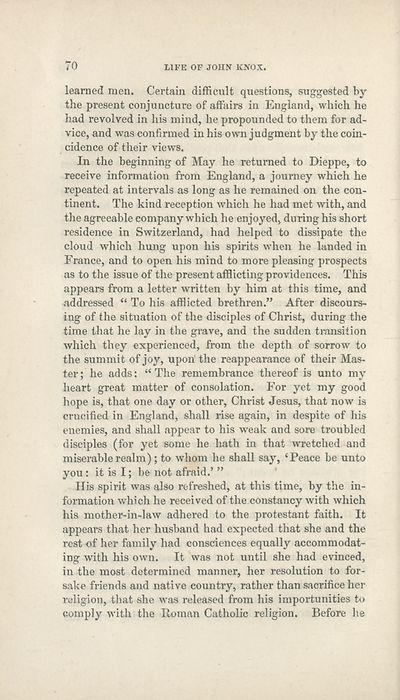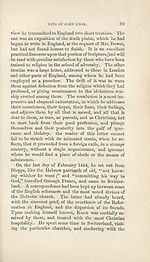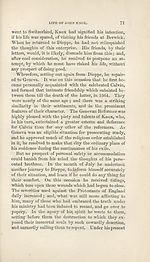Download files
Complete book:
Individual page:
Thumbnail gallery: Grid view | List view

70
LIFE OF JOHN KNOX.
learned men. Certain difficult questions, suggested by
the present conjuncture of affairs in England, which he
had revolved in his mind, he propounded to them for ad¬
vice, and was confirmed in his own judgment by the coin¬
cidence of their views.
In the beginning of May he returned to Dieppe, to
receive information from England, a journey which he
repeated at intervals as long as he remained on the con¬
tinent. The kind reception which he had met with, and
the agreeable company which he enjoyed, during his short
residence in Switzerland, had helped to dissipate the
cloud which hung upon his spirits when he landed in
France, and to open his mind to more pleasing prospects
as to the issue of the present afflicting providences. This
appears from a letter written by him at this time, and
addressed “ To his afflicted brethren.” After discours¬
ing of the situation of the disciples of Christ, during the
time that he lay in the grave, and the sudden transition
which they experienced, from the depth of sorrow to
the summit of joy, upon' the reappearance of their Mas¬
ter; he adds: “The remembrance thereof is unto my
heart great matter of consolation. For yet my good
hope is, that one day or other, Christ Jesus, that now is
crucified in England, shall rise again, in despite of his
enemies, and shall appear to his weak and sore troubled
disciples (for yet some he hath in that wretched and
miserable realm); to whom lie shall say, ‘Peace be unto
you: it is I; be not afraid.’ ”
His spirit was also refreshed, at this time, by the in¬
formation which he received of the constancy with which
his mother-in-law adhered to the protestant faith. It
appears that her husband had expected that she and the
rest of her family had consciences equally accommodat¬
ing with his own. It was not until she had evinced,
in the most determined manner, her resolution to for¬
sake friends and native country, rather than sacrifice her
religion, that she was released from his importunities to
comply with the Roman Catholic religion. Before he
LIFE OF JOHN KNOX.
learned men. Certain difficult questions, suggested by
the present conjuncture of affairs in England, which he
had revolved in his mind, he propounded to them for ad¬
vice, and was confirmed in his own judgment by the coin¬
cidence of their views.
In the beginning of May he returned to Dieppe, to
receive information from England, a journey which he
repeated at intervals as long as he remained on the con¬
tinent. The kind reception which he had met with, and
the agreeable company which he enjoyed, during his short
residence in Switzerland, had helped to dissipate the
cloud which hung upon his spirits when he landed in
France, and to open his mind to more pleasing prospects
as to the issue of the present afflicting providences. This
appears from a letter written by him at this time, and
addressed “ To his afflicted brethren.” After discours¬
ing of the situation of the disciples of Christ, during the
time that he lay in the grave, and the sudden transition
which they experienced, from the depth of sorrow to
the summit of joy, upon' the reappearance of their Mas¬
ter; he adds: “The remembrance thereof is unto my
heart great matter of consolation. For yet my good
hope is, that one day or other, Christ Jesus, that now is
crucified in England, shall rise again, in despite of his
enemies, and shall appear to his weak and sore troubled
disciples (for yet some he hath in that wretched and
miserable realm); to whom lie shall say, ‘Peace be unto
you: it is I; be not afraid.’ ”
His spirit was also refreshed, at this time, by the in¬
formation which he received of the constancy with which
his mother-in-law adhered to the protestant faith. It
appears that her husband had expected that she and the
rest of her family had consciences equally accommodat¬
ing with his own. It was not until she had evinced,
in the most determined manner, her resolution to for¬
sake friends and native country, rather than sacrifice her
religion, that she was released from his importunities to
comply with the Roman Catholic religion. Before he
Set display mode to:
![]() Universal Viewer |
Universal Viewer | ![]() Mirador |
Large image | Transcription
Mirador |
Large image | Transcription
| Antiquarian books of Scotland > Scotland/Scots > Life of John Knox ; and, The life of Alexander Henderson > (88) |
|---|
| Permanent URL | https://digital.nls.uk/131833360 |
|---|
| Description | Thousands of printed books from the Antiquarian Books of Scotland collection which dates from 1641 to the 1980s. The collection consists of 14,800 books which were published in Scotland or have a Scottish connection, e.g. through the author, printer or owner. Subjects covered include sport, education, diseases, adventure, occupations, Jacobites, politics and religion. Among the 29 languages represented are English, Gaelic, Italian, French, Russian and Swedish. |
|---|

